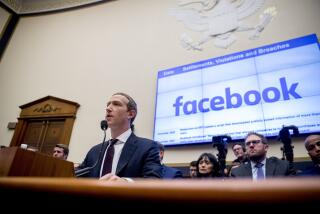House Committee Might Subpoena Global Chairman
- Share via
WASHINGTON — A congressional panel Thursday threatened to subpoena Global Crossing Ltd. Chairman Gary Winnick as part of its investigation into charges that the telecommunications firm used misleading accounting to prop up its financial results ahead of major stock sales by Winnick and others.
Investigators for the House Energy and Commerce Committee have been trying for weeks to arrange an interview with Winnick, but the 54-year-old executive and his lawyer have insisted on a number of undisclosed conditions for the meeting, said Ken Johnson, spokesman for committee Chairman W.J. “Billy” Tauzin (R-La.).
“Mr. Winnick has a choice: He can appear voluntarily and meet with our investigators, or in all likelihood he will be subpoenaed,” Johnson said.
Gary P. Naftalis, an attorney representing Winnick, said his client is dealing with the committee “appropriately,” and has cooperated and provided documents to investigators. He declined to discuss the negotiations with the panel or the possibility of a subpoena.
On Thursday, the committee released several Global Crossing documents, including a series of internal e-mails and the minutes of an end-of-quarter board meeting, that appear to show how executives used sham transactions to bolster revenue and help the ailing fiber-optic network operator meet Wall Street projections.
Bermuda-based Global Crossing filed for Bankruptcy Court protection Jan. 28, listing $12 billion in debts and $22 billion in assets--making it the nation’s fourth-largest case at the time. The company became the subject of investigations by the Securities and Exchange Commission and the FBI shortly after a former employee’s allegations of financial misconduct came to light a few days after the Chapter 11 filing.
The House commerce committee has been investigating the company since February, and recently has begun focusing on allegations that Winnick and other executives hid the company’s deteriorating condition through faulty accounting, then made large stock sales in May 2001 with inside knowledge of the company’s looming financial troubles.
Winnick, by far the largest Global Crossing shareholder, pocketed about $124 million on a May 23 sale of nearly 10 million shares. Board members Lodwrick Cook, Joseph Clayton, Jack Scanlan and then-President David Walsh sold significant amounts of stock that month.
Naftalis, Winnick’s attorney, rejected any suggestion of insider trading.
“Gary’s stock sale in May of 2001 was done with all legal and regulatory and corporate approvals,” he said.
“Gary possessed no inside information which would have prevented him from making the stock sale, and there’s not a shred of evidence that the sale in May was in any way improper.”
Investigators for the commerce committee have been plowing through boxes of Global Crossing documents, reviewing computer disks of e-mails and interviewing more than a dozen current and former company employees.
The evidence “raises suspicions of possible insider trading,” Johnson said.
The documents released Thursday show that the company rushed through a so-called capacity-swap with troubled rival 360Networks Inc. late on March 30, the last day of the first quarter in 2001.
Under terms of the deal, the two companies exchanged capacity on their respective networks, with 360Networks buying $150 million worth of capacity from Global, and Global buying $200 million in capacity on a 360Networks cable under construction in the Atlantic. Global Crossing shipped the net amount--$50 million--to 360Networks before midnight March 30.
Global received no cash in the deal, but accounted for the transaction in a way that included the $150-million purchase by 360Networks in its figures for “cash revenue” and “adjusted EBITDA,” or earnings before interest, taxes, depreciation and amortization.
“Global Crossing forked over $50 million in cold hard cash and got nothing in return but a bloated financial statement,” Johnson said.
“Our whistle-blower told us that this deal was done so the company could meet its first-quarter numbers.”
He declined to name the whistle-blower.
The 360Networks deal was approved late that afternoon at a telephonic board meeting by Global’s executive committee, which consisted of Winnick, then-Chief Executive Tom Casey and outside director William Conway Jr. The three directors approved the deal after a staff presentation on the transaction.
Johnson said general counsel James Gorton and others objected to the deal, but Global attorney Ralph Ferrara said “there is no evidence that Gary Winnick forced this transaction or that Jim Gorton opposed this transaction or that anyone opposed this transaction.”
Ferrara said the deal was legitimate, and the company was getting capacity in the North Atlantic, where it expected to have a shortage in coming years.
Separately, an e-mail exchange between Gorton and Casey released by the committee showed that reciprocal deals didn’t bring much-needed cash to the company.
“They are a tacit admission that many of these deals were nothing more than financial hocus-pocus,” Johnson said.
Shiver reported from Washington and Douglass from Los Angeles.
More to Read
Inside the business of entertainment
The Wide Shot brings you news, analysis and insights on everything from streaming wars to production — and what it all means for the future.
You may occasionally receive promotional content from the Los Angeles Times.










